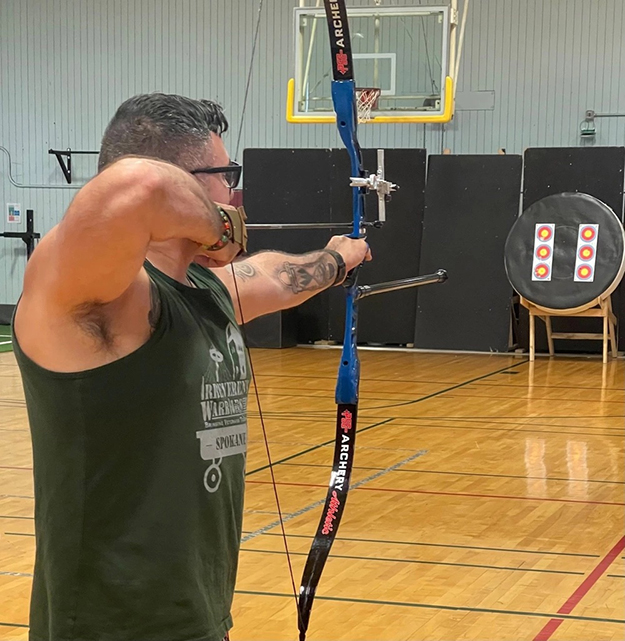FALLS CHURCH, Va. - Army Sgt. Sergio Calderon Diaz looks back at his 17 years in the Washington State National Guard, knowing he made the right decision to join. "It just happened. I wasn't sure I would like the military, so I picked the guard. I started with a three-year contract, and I liked what I did so much I kept reenlisting," he said with a chuckle.
The infantryman was a typical soldier who always wanted to see the mission through no matter what hardships happened. His last deployment, however, concluded with a new mission: to get better at a Soldier Recovery Unit.
"I was on a deployment in Poland; needless to say, that terrain is unforgiving. I returned with tears in my rotator cuff and had to get my bicep reattached to my left shoulder. I had a bulging disc in my lower back, a tear in my meniscus, and a partial tear in my ACL."
In March 2023, Calderon Diaz arrived at the Joint Base Lewis-McChord (JBLM) Soldier Recovery Unit (SRU) in Washington state.
"I didn't know what the Army Recovery Care Program did. Most of us don't complain about our injuries until they get really bad. When I first arrived, I didn't know what was going on. They gave me this list and told me I had to talk to all these people and get these things signed off, and the next thing I know, I'm getting slammed with appointments," he said, recognizing that this was a good thing! It's time to take care of the whole soldier, you know, that soldier who wants to see the mission through despite any hardships.
"Anything I had wrong in the last decade I listed on paperwork, and they listened and got me appointments needed to take care of everything. It's definitely nice."
The divorced father of three endured two surgeries so far and is working through his physical and occupational therapy journey. He says it was slow at first when the reality of his fate set in.
"I played three years of semi-pro football, so to be told I wouldn't play again was a real kick in the gut. Dave Iuli, an Adaptive Reconditioning Specialist at our SRU, has been great about chatting up adaptive sports. One of the things that caught my eye was archery. I grew up shooting archery and hunting, which got my interest."
He started coming to some of the programs and learned he still can participate in things he loves differently. He is attending Pacific Trials in Hawaii, a precursor to the Army Trials in Spring, for a coveted spot on Team Army.
"I've had to dial it down in archery. I was used to pulling back a 60-pound plus bow, and now I'm shooting around a 40-ish. It's interesting having to knock out different stabilization exercises to regain that strength." He is learning these things on his journey to recover and overcome at the JBLM SRU.
The visit to the SRU, he says, was worth it and continues to improve his everyday life. "I've started doing yoga every Tuesday and Thursday. I went to a leather class and made a bookmark. Trust me, I'm doing tons of things I never thought I would ever be doing." He gladly tells anyone that these things, no matter how small or odd they may seem, help him and others get better so they can get back in the fight or start the next chapter in their life.
"For me, a lot of the mental work helps. I'm being told I will not be able to do certain things again, so I guess participating in these adaptive reconditioning things shows me that I can get out of my comfort zone, try new things, and be good at it."
He plans to take what he's learned in this process as he medically retires from the Army and work toward earning his master's in psychology. He wants to be a Licensed Clinical Social Worker. He hopes his departing words from the program resonate with others facing the same dilemma.
"Walk into it with an open mind and try everything. Once I learned how to accept my fate, it was amazing the things I learned I could do. It felt like defeat when I was first given my fate, and they helped me realize that's not the case."





Read Comments